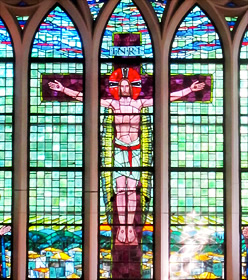Sheng Kung Hui(聖公會)literally means "Holy Catholic Church" in Chinese. It was the Chinese name used in the Church since mid-nineteenth century when the British Anglican and the American Episcopalian missionaries first came to China. The same Chinese characters (聖公會)are also used in the Anglican Church of Korea, the Nippon Sei Ko Kai in Japan and other Chinese Anglican and Episcopal churches in the region.
Sheng Kung Hui had been rooting in Hong Kong for almost 170 years. The first presence of the Anglican Church in Hong Kong began with the appointment of The Revd. Vincent Stanton as Colonial Chaplain in 1843. After several years of planning and construction, St. John's Cathedral was founded in 1849, and St. Paul's College was established in 1851, as one of the oldest secondary school in the territory. In 1849, the Diocese of Victoria was created by Royal Letters Patent. The Rt. Revd. George Smith was appointed the first bishop in Hong Kong. Bishop Smith had a clear vision in the ministry of the local Chinese under his jurisdiction. St. Stephen's Church, the first Chinese Anglican Church in Hong Kong, was founded in 1865.
Bishop's House on Lower Albert Road, Central
In line with the growth of the Chinese congregations, the Chinese Anglican Church in Hong Kong became part of The Diocese of South China (Chinese), which held its first Synod in 1913, under the Chung Hua Sheng Kung Hui (i.e. "The Holy Catholic Church of China"), and at the same time continued to be under The Diocese of Victoria (English). Owing to the subsequent changes of the political situation in the Mainland China, the Anglican Church in Hong Kong departed from The Diocese of South China in 1951, and on her own the Diocese of Hong Kong and Macao (both Chinese and English) was established to continue the ministry of the Kingdom of God in these two regions.
In 60s-80s, with the influx of immigrants from the Mainland China and the rapid changes of the economic and social structure in Hong Kong and Macau, the Anglican Church was responsive to the needs of the community through her commitment in the areas of mission work, social services and education. The Church established Hong Kong Sheng Kung Hui Welfare Council in 1966, which was dedicated to offering a wide range of social services on person-centered approaches for various age groups and strata in the society. And by providing quality education (now over 30 secondary schools, 60 primary schools and 30 kindergartens) in the local community, the Church is devoted to cultivate students in a holistic way through moral, intellectual, physical fitness, social, aesthetic and spiritual development.
In order to cope with the challenges and the new developments of the Anglican Church in Hong Kong and Macau, as well as to acquire a more formal institutional grounding, the Hong Kong Sheng Kung Hui was formally established as a Province on 25th October 1998. The Most Revd Peter Kwong was elected as the first Archbishop and the Primate of the Province. Same as the rest 42 provinces of the Anglican Communion, the Hong Kong Sheng Kung Hui is an independent and self-governing entity, but yet upholds the same faith in the fellowship of the worldwide Anglican Communion. This signifies the spirit of the Anglicanism, "Though we are many, we are in one body."
Inauguration of the Province of the Hong Kong Sheng Kung Hui
Hong Kong Sheng Kung Hui now constitutes 3 dioceses (including The Diocese of Hong Kong Island, The Diocese of Eastern Kowloon, and The Diocese of Western Kowloon) and 1 missionary area (the Missionary Area of Macau). At present, the Archbishop and Primate of the Province of Hong Kong Sheng Kung Hui and Bishop of Western Kowloon are The Most Revd. Andrew Chan; the Bishop of Eastern Kowloon is The Rt. Revd Timothy Kwok; the Bishop of Hong Kong Island is The Rt. Revd. Der Tze Wo Matthias Clement.
 |
|
Thanks to the blessing and guidance of the Heavenly Father, the ministry of the Church continues to flourish in the areas of Evangelism, Pastoral Work, Education and Social Services, so the Love of Jesus is witnessed and shared in the local community, as the Bible said, "And the Word became flesh and lived among us, and we have seen his glory, the glory as of a father's only son, full of grace and truth." |